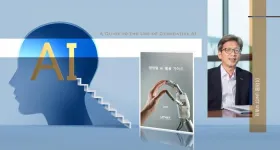(Press-News.org) Justifying policies through unsubstantiated or slightly invalid arguments can have a significantly negative effect on the public opinion of politicians, according to new research from City, University of London.
With increasing scrutiny on global government policies in a ‘post-truth’ era, and in the aftermath of the Covid-19 pandemic that polarised international responses and reactions to the virus, an increased focus has been placed on policymakers to justify their actions and validate reasons for taking decisions.
Short of lying, this can often politicians “stretching arguments” – making invalid claims that are difficult to both prove and disprove.
The study, by Dr Konstantin Vössing, Senior Lecturer in Comparative Politics at City, sought to explore how perceived validity of arguments when imposing policies affected both the popularity and support of the policy, and that of the individuals implementing them.
Key findings from the research include:
Stretching an argument creates a significant negative effect on people’s opinions towards a politician. Those who use argument-stretching statements are considerably less popular, on a 0-100 scale, than those who use more valid arguments.
Argument-stretching also affects credibility of the policies themselves. People are more likely to express support for a policy presented using an irrefutable argument than an invalid one.
The additional presence of a directly opposed argument, however, reduces the negative effects of a stretched argument against that of a more valid one for both policy and policy maker. This is an important consideration for opposition, as strategic politicians might benefit from holding back on expressing views whenever they expect opponents to harm their own reputation and public support for policies with stretched arguments.
Failure to justify a policy at all prompts an even less favourable response to both policy and politician than presenting a stretched argument.
Dr Vössing’s research involved three separate field studies with samples representative of the voting public in Germany. The first was a laboratory test involving 332 participants of mixed ages, genders, education and social class, with participants reading a fictional newspaper article about a proposed ‘Euro-tax’ and its benefits for EU members. The article featured quotes from a Member of the European Parliament (MEP) with participants given one of two versions – one where they used argument-stretching to extol the benefits of the tax, and one where they used a more factually valid justification. Participants were then asked to give their approval on the policy and MEP spokesperson.
A second study repeated this process, but as a survey with 1,306 participants with Forsa, the polling company. The second study presented a selection of participants with a third variation on the news story – one with no argument or justification for being in favour of the tax.
A third study of 348 laboratory participants repeated the first two studies, but also introduced a counter argument, in the shape of one of two quotes from an MEP who was opposed to the tax – with and without justification for this opposition.
The results suggest ‘stretching’ an argument is counterproductive for the credibility of a politician and the policy they are supporting. However, Dr Vössing commented that there were a range of other factors which may determine their motivation to do so.
“Politicians carry a range of naturally conflicting considerations, which go a long way towards explaining why they may wish to stretch an argument,” he said.
“They tend to try and boost their public support in three ways, either through endorsing a popular policy, creating a goal to justify an endorsement of a policy, or making a non-stretched argument about how a policy with affect a goal. However, it is generally impossible to achieve all three.
“Sometimes, politicians decide to connect a popular policy to a popular goal and accept that the link between the two might not be entirely valid. They stretch the argument so that they can mention the policy together with the popular goal.
“For instance, funding universal healthcare through the NHS is a very popular goal. Supporters of Brexit claimed that the policy of leaving the EU would have a positive effect on that goal. But we know now that the argument was stretched. It was convincing to many audiences at the time, despite the stretched argument, because it combined a popular policy with a popular goal.”
“Alternatively, they may just want to say something to justify a goal, which, as the research suggests, has a more positive impact than no argument at all. At the same time, making a stretched argument might be seen as necessary if it leads to the success of a more valued, wider overall objective.”
Dr Vössing said the study had implications on governance and the integrity of elected officials.
“Even if the negative effects of argument-stretching dilute over time, the effect of cumulative cases could have profound negative consequences on democracy and the overall political class,” he continued.
“Politicians may get away with the very occasional stretch if the negative subsequent effects on their popularity subside, but the build-up of invalid arguments over time could undermine deliberation and accountability, and directly compromise democratic procedures and values.
“Honesty and integrity are essential in a democratic society. Even if there is a difference between lying and stretching an argument, persistent use of the latter can easily cloud this difference over time.
“Elected politicians must be careful to ensure they promote policies with sound justification to remain accountable to the voting public.
‘Argument-stretching: (slightly) invalid political arguments and their effects on public opinion’ by Dr Konstantin Vössing is published in European Political Science Review.
END
Stretching the truth: New research reveals negative effects of exaggerative political statements
Justifying policies through unsubstantiated or slightly invalid arguments can have a significantly negative effect on the public opinion of politicians, according to new research from City, University of London.
2023-09-14
ELSE PRESS RELEASES FROM THIS DATE:
Aegis Consortium funds research aimed at reducing the threat of future pandemics
2023-09-14
The Aegis Consortium, an initiative of the University of Arizona Health Sciences, awarded approximately $650,000 in seed funding to eight pilot research projects in the areas of pandemic control, prediction or preparedness; post-acute effects of pandemics on individuals and societies; and the resilience of built and natural environments.
“As we explore the challenges of pandemics such as COVID-19, we will continue to expand our investigative reach with domestic and international research teams to provide a range ...
UNIST releases generative AI utilization guide to promote smart usage of ChatGPT
2023-09-14
Under the leadership of UNIST Education Innovation Task Force, a comprehensive guidebook titled ‘A Guide to the Use of Generatvie AI‘ was released on July 28, 2023. This guidebook presents alternative approaches to utilize generative AI, like ChatGPT more efficiently rather than simply prohibiting their use. With a focus on teachers, researchers, and students, the 50-page guidebook provides practical examples of generative AI utilization.
To gain insights into the purpose and development ...
Preventing the tissue's response to stiffness may be key to slowing the progression of breast tumors
2023-09-14
Cells are capable of translating mechanical changes into biological responses. This process is known as mechanotransduction and plays a fundamental role in the progression of solid tumors, such as breast cancer.
It is well-established that a common mechanical alteration in cancer progression involves tissue hardening. This stiffness is precisely what is detected during self-examinations or breast palpations for potential tumor detection. The stiffness of breast tissue triggers a chain reaction, inducing tension within cells and distorting their nuclei. Ultimately, this nuclear deformation activates genes responsible for controlling cell proliferation, which are closely associated ...
Members of the National Association of Neonatal Nurses support efforts to promote racial equity
2023-09-14
September 14, 2023 — More than 90% of the active members of the National Association of Neonatal Nurses (NANN) believe the organization should pursue racial equity work, and many have specific suggestions for a strategic plan. This feedback comes from the survey results the association released this month in its journal, Advances in Neonatal Care. The journal is published in the Lippincott portfolio by Wolters Kluwer.
"Neonatal care has advanced significantly in recent years, yet ...
Webb Confirms accuracy of universe’s expansion rate measured by Hubble, deepens mystery of Hubble constant tension
2023-09-14
The rate at which the universe is expanding, known as the Hubble constant, is one of the fundamental parameters for understanding the evolution and ultimate fate of the cosmos. However, a persistent difference called the “Hubble Tension” is seen between the value of the constant measured with a wide range of independent distance indicators and its value predicted from the big bang afterglow.
NASA’s James Webb Space Telescope provides new capabilities to scrutinize and refine some of the strongest observational evidence for this tension. Nobel Laureate Adam Riess from the Johns Hopkins University and ...
Penn Medicine’s Carl June, MD, to receive 2024 Breakthrough Prize in Life Sciences
2023-09-14
PHILADELPHIA – CAR T cell therapy pioneer Carl June, MD, the Richard W. Vague Professor in Immunotherapy in the Perelman School of Medicine at the University of Pennsylvania and director of the Center for Cellular Immunotherapies (CCI) at Penn Medicine’s Abramson Cancer Center, has been named a winner of the 2024 Breakthrough Prize in Life Sciences for the development of chimeric antigen receptor (CAR) T cell immunotherapy, a revolutionary cancer treatment approach in which each patient’s T cells are modified to target and kill their cancer cells. The invention sparked a new path in cancer care, harnessing the power of patients’ own immune systems, a once-elusive ...
New research published by Nature Food reveals food is primary driver of the EU-27’s outsized Ecological Footprint
2023-09-14
One quarter of food consumed in the EU-27 originates from outside the region, highlighting the vulnerability of the EU’s food system.
New research coordinated by Global Footprint Network’s sustainability scientists in collaboration with food system experts published the article “EU-27 Ecological Footprint was primarily driven by food consumption and exceeded regional biocapacity from 2004 to 2014” today in Nature Food. The way food is provided to and consumed by Europeans represents ...
Rivers are rapidly warming, losing oxygen; aquatic life at risk, study finds
2023-09-14
UNIVERSITY PARK, Pa. — Rivers are warming and losing oxygen faster than oceans, according to a Penn State-led study published today (Sept. 14) in the journal Nature Climate Change. The study shows that of nearly 800 rivers, warming occurred in 87% and oxygen loss occurred in 70%.
The study also projects that within the next 70 years, river systems, especially in the American South, are likely to experience periods with such low levels of oxygen that the rivers could “induce acute death” for certain species of fish and threaten aquatic diversity at large.
“This is a wake-up call,” ...
London has the fastest increase in cooling demand in the world, shows new model
2023-09-14
A model to map energy demand down to street level shows cooling demand in the capital grew by 5% per year between 1980 and 2022 as summers heat up.
The Demand.ninja model, created by researchers at Imperial College London and TU Delft, was designed to show how the weather influences hourly energy consumption in buildings. It can also account for changes in demand as the climate changes, including the increase in cooling demand in the summer as heatwaves become more common and more intense.
Countries ...
New research signals a quantum leap for brain tumour treatment
2023-09-14
Researchers have discovered a new way to target and kill cancer cells in hard-to-treat brain tumours using electrically charged molecules to trigger self-destruction, that could be developed into a spray treatment used during surgery.
A multidisciplinary team of researchers from the University of Nottingham, led by the School of Pharmacy found a new way to harness the extraordinary capabilities of bio-nanoantennae—gold nanoparticles intricately coated with specialised redox active molecules to induce programmed cell death, or apoptosis, in cancer cells on electrical stimulation. The research ...
LAST 30 PRESS RELEASES:
Under the Lens: Microbiologists Nicola Holden and Gil Domingue weigh in on the raw milk debate
Science reveals why you can’t resist a snack – even when you’re full
Kidney cancer study finds belzutifan plus pembrolizumab post-surgery helps patients at high risk for relapse stay cancer-free longer
Alkali cation effects in electrochemical carbon dioxide reduction
Test platforms for charging wireless cars now fit on a bench
$3 million NIH grant funds national study of Medicare Advantage’s benefit expansion into social supports
Amplified Sciences achieves CAP accreditation for cutting-edge diagnostic lab
Fred Hutch announces 12 recipients of the annual Harold M. Weintraub Graduate Student Award
Native forest litter helps rebuild soil life in post-mining landscapes
Mountain soils in arid regions may emit more greenhouse gas as climate shifts, new study finds
Pairing biochar with other soil amendments could unlock stronger gains in soil health
Why do we get a skip in our step when we’re happy? Thank dopamine
UC Irvine scientists uncover cellular mechanism behind muscle repair
Platform to map living brain noninvasively takes next big step
Stress-testing the Cascadia Subduction Zone reveals variability that could impact how earthquakes spread
We may be underestimating the true carbon cost of northern wildfires
Blood test predicts which bladder cancer patients may safely skip surgery
Kennesaw State's Vijay Anand honored as National Academy of Inventors Senior Member
Recovery from whaling reveals the role of age in Humpback reproduction
Can the canny tick help prevent disease like MS and cancer?
Newcomer children show lower rates of emergency department use for non‑urgent conditions, study finds
Cognitive and neuropsychiatric function in former American football players
From trash to climate tech: rubber gloves find new life as carbon capturers materials
A step towards needed treatments for hantaviruses in new molecular map
Boys are more motivated, while girls are more compassionate?
Study identifies opposing roles for IL6 and IL6R in long-term mortality
AI accurately spots medical disorder from privacy-conscious hand images
Transient Pauli blocking for broadband ultrafast optical switching
Political polarization can spur CO2 emissions, stymie climate action
Researchers develop new strategy for improving inverted perovskite solar cells
[Press-News.org] Stretching the truth: New research reveals negative effects of exaggerative political statementsJustifying policies through unsubstantiated or slightly invalid arguments can have a significantly negative effect on the public opinion of politicians, according to new research from City, University of London.




